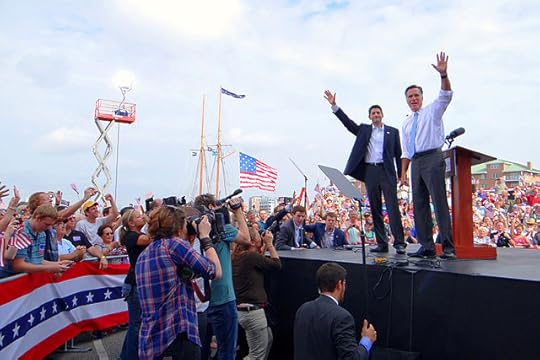Romney needed to pick Ryan
Oxford University Press USA is putting together a series of articles on a political topic each week for four weeks as the United States discusses the upcoming American presidential election, and Republican and Democratic National Conventions. Last week our authors tackled the issue of money and politics. This week we turn to the role of political conventions and party conferences (as they’re called in the UK).
By David C. Barker and Christopher Jan Carman
Congressman Paul Ryan (R-WI), the new Republican vice presidential nominee, has many virtues as a candidate. He is smart, charismatic and energetic, and he hails from a competitive but usually blue-leaning state that the GOP would like to secure into the red column. But one of Ryan’s virtues stands out above the rest for the Tea Partiers and other conservatives whom Governor Romney is still trying to win over. Ryan is perceived as being a person of conviction — someone who comes to his policy positions based on his commitment to certain ideological principles, and who will not alter those positions based on changes in what his constituents may want (i.e. polls). He doesn’t shy away from the unpopular House budget from the last two years that bears his name, which would have saved billions of dollars by turning Medicare into a voucher program, among other things. And that is just one example. Conservatives admire Ryan for “sticking to his guns.”

Mitt Romney & Paul Ryan at a rally in Norfolk, VA. Photo by James Currie, 11 August 2012. Creative Commons License.
This reputation of Ryan’s stands in contrast, of course, to the reputation Romney has garnered (fairly or not) as an opportunistic flip-flopper who panders to public opinion. And this is why Romney stands to gain — with the Republican base at least — with what is otherwise being viewed as a risky, Hail Mary pass of a pick. (For all of Ryan’s political virtues, after all, he also has some drawbacks. He is quite young and relatively inexperienced for a top-of-the ticket type of candidate, and he is viewed by many as ideologically extreme and rigid.) What Romney needs more than anything else is for “his people” to trust him enough to show up in droves this November. Without that, he has no chance of beating Obama — or even coming close. And for the base to do that, they need to have someone on the ticket whom they feel like they can trust and believe in. By picking Ryan, Romney has helped his case with that all-important constituency.
If Romney were a Democrat, he probably wouldn’t have to worry about such things. After all, Al Gore, John Kerry, and Bill Clinton labored under the “pandering flip-flopper” label as well, but it didn’t hurt them with the Democratic base in the way that Romney suffers with his base. The reason is that Democrats actually tend to appreciate politicians whose policy positions evolve in service to changes in public opinion.
In other words, liberal Democrats on average tend to embrace the popular democratic vision much more readily than conservative Republicans do. On the other hand, conservative Republicans on average tend to express greater appreciation for elected officials who “lead” based on internalized principles, thus spurning capricious public opinion. What this means is that liberal, “blue” America is a different type of representative democracy than is conservative “red” America — one where citizens have much more direct, policymaking power over what their representatives do.
David C. Barker and Christopher Jan Carman are the authors of Representing Red and Blue: How the Culture Wars Change the Way Citizens Speak and Politicians Listen. David C. Barker is Associate Professor of Political Science at the University of Pittsburgh and Director Designate of the Institute of Social Research at California State University – Sacramento. Since receiving his PhD from the University of Houston in 1998, he has authored dozens of scholarly journal articles on the subjects of public opinion and electoral politics. His previous book, Rushed to Judgment? Talk Radio, Persuasion, and American Political Behavior, was nominated for several awards. Christopher Jan Carman is Senior Research Lecturer in Government at the University of Strathclyde. He received his PhD from the University of Houston in 2000. He is also a co-author of Elections and Voters in Britain, 3rd ed. He has served as a consultant for the Scottish Parliament and a psephologist for BBC News.
Subscribe to the OUPblog via email or RSS.
Subscribe to only law and politics articles on the OUPblog via email or RSS.
View more about this book on the 




Oxford University Press's Blog
- Oxford University Press's profile
- 238 followers



